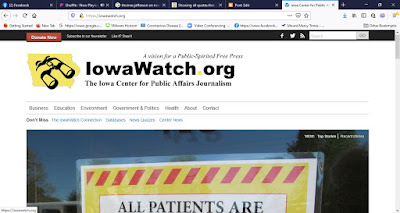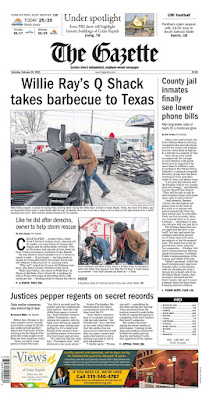
This week's issue of MMU's own newspaper.
“Newspapers are in a perilous position: Traditional readership is declining even as papers are struggling to create a profitable online business model.” Understanding Media online text.
In 2021, newspapers are a shadow of what they once were. In media history, we are studying the legacies of the great 19th century publishers, Hearst and Pulitzer. In their era, they wielded power and defined a whole new, important information industry.
Newspapers are at the root of news in this country, and those roots are deep and ancient. Thomas Jefferson, the country’s third president is often quoted by newspaper fans: “Were it left to me to decide whether we should have a government without newspapers or newspapers without a government, I should not hesitate a moment to prefer the latter.”
Those are Jefferson’s verified words, but he also wrote: “The man who reads nothing at all is better educated than the man who reads nothing but newspapers.”
Clearly, Jefferson was conflicted, but the papers of his era were deeply partisan and not at all neutral in their reporting. In media history at the end of this week, we’ll talk about why that dramatically changed, first with the rise of Pulitzer who emphasized fully reporting each story, and then with Adolph Ochs, the “New York Times” publisher who will reshape the media industry early in the 20th century.
For more than 200 years, newspapers were the key way most people got information about the events of the day. That monopoly on news ended in the 20th century with a series of three media revolutions—the coming of radio, then TV, then the internet.
This century, the 21st, has seen a great decline in the number of papers published, the number of journalists working at papers and the profitability and viability of many newspapers. The public has broken its newspaper habit in this century.
It’s also true that part of what has ended the newspaper era is declining literacy. There are young readers—I’ve had spirited discussion with more than one MMU students about the new novels by Hank Green, for example. Yet reading is not understood as central to getting information as it once was.
But it is. There’s the rub. To a frightening extent, people who say they get their information from sources other than the printed word—who don’t read newspapers—are often people who don’t know disinformation from information—fake news from reality.
I don’t mean to imply that I think all is lost if we don’t go back to the newspaper era. It’s something that can’t and won’t happen—history doesn’t move in reverse. Yet, the energy in news media today, the innovation and creativity, is around new online sources.
In Iowa, for example, The Gazette works hard to be an online publication as much as it is a paper newspaper. New sources such as Little Village Magazine compete to delivery news. The investigative role that newspapers in Iowa once fulfilled is partly taken on by an online nonprofit, Iowa Watch, located in Iowa City but independent of the university there.
 |
| Home page of Iowa Watch, an investigative foundation in Iowa City that distributes its news stories for free. |
- Acing as Gatekeeper or agenda setter. Local papers still help define the conversation, the issues that people talk about or care about; yet they are not as important in this area as they once were, as social media today creates the cultural “buzz.” When papers did act as information gatekeepers, one advantage society had was that there was some sense of professionalism in terms of what was treated as a fact—whereas today, the information environment is looser and less easily defined. Newspapers saw their agenda-setting function degrade when radio and TV came on the scene, but it was the internet that mostly ended this role.
- Being a watchdog. That’s honestly one of the key roles newspapers still provide. What does a “watchdog” do? Think of what you know about the Watergate scandal of the 1970s—at the time, it was two reporters for “The Washington Post” who uncovered corruption that eventually led to the resignation of President Richard Nixon. Even today, some papers, such as the Post and “The New York Times,” and, in Iowa, “The Gazette” still strive to fulfill that function. But an issue in our culture today is that many communities have become “news deserts” where local papers have failed—and that can create a situation where actions of government are not monitored much anymore.
- Providing “objective” information. Media bias is a complex issue, and not a “fake” thing because all media has some point of view—it’s just not the simple case of “liberal” mainstream media that is sometime portrayed. Nevertheless, traditionally, newspapers provide the most basic, factual account of events of day. They still do, where they exist, but it’s more important for consumers of information to be wary of the cacophony of disinformation available today that can drive out information.
 |
| Feb. 20 front page of Iowa's largest paper. |
Perhaps it won’t be one thing. Perhaps there is some new balance between competing sources that may yet emerge and provide us with some clarity and some insight that we need. Stay tuned.
Meanwhile, be aware that whether you’re looking at Fox, CNN or the New York Times, you may be looking at lots of different kinds of materials in the same place. To be a literate consumer, recognize that most media outlets may give you:
- Opinion writing. The Gazette has two on-staff opinion writers whose stories are not meant to be objective journalism, but are interpretive. Often, inexperienced readers or student researchers will quote something from, say “The Wall Street Journal,” without realizing they are quoting an opinion writer or columnist, not a news report. When you consume news, understand what you’re looking at.
- Inverted pyramid reporting. “Plain vanilla” news stories—most reports of breaking news that you can read either online or in print—use this format. The story starts with a “summary lead,” a first paragraph that states what the latest development is. It then reports information in descending order of importance. One way to know whether you’re reading someone’s interpretation of the news or an actual news report is to be used to seeing and recognizing this story format.
 In sum: Newspapers remain, even in 2021, an often important, fundamental part of the news ecosystem. But they are not the central element that they once were.
In sum: Newspapers remain, even in 2021, an often important, fundamental part of the news ecosystem. But they are not the central element that they once were.
As with last week, here are some additional posts that cover important newspaper-related topics:
Thoughts on MMU’s newspaper, which won seven awards from a state media organization, February, 2021.
https://iowamedialife.blogspot.com/2021/02/mmu-times-wins-7-icma-state-awards.html
A previous post about a previous semester of this class, has spoilers about your next paper, February, 2015.
https://iowamedialife.blogspot.com/2015/02/the-sudden-appearance-of-newspapers-for.html
How newspapers fix the memory of national trauma, thoughts on the Parkland, Florida school shooting, February, 2018.
https://iowamedialife.blogspot.com/2018/02/front-pages-fix-memory-of-florida.html
Why the student newspaper experience is important—why you should join the staff of the “Mount Mercy Times” even in this post-newspaper world, April 2009.
https://crgardenjoe.wordpress.com/2009/04/19/future-of-college-newspapers/
Some thoughts on the role of newspapers as a Mount Mercy journalism class tours The Gazette, April 2015.
https://crgardenjoe.wordpress.com/2015/04/23/drinking-from-the-firehose-learning-what-journalistm-is-like/


No comments:
Post a Comment